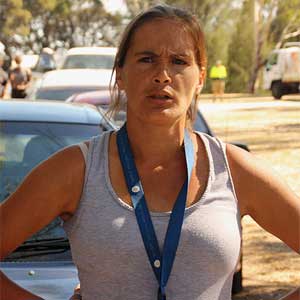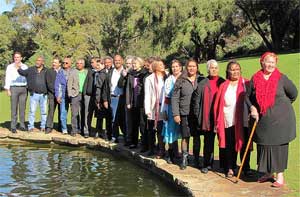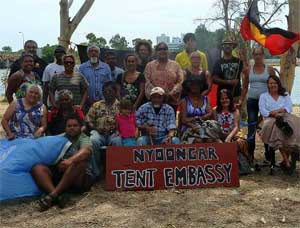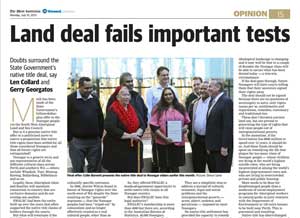Both sides debate Noongar land deal
Noongar Sovereign Embassy's Marianne Mackay said that the land deal was a sell-out of Noongar people's rights, and that the package returned very little in real terms to impoverished and hard-done-by Noongars. Ms Mackay said that there was no redress, reparation or "sovereignty rights."

Marianne Headland MacKay

South West Aboriginal Land and Sea Council (SWALSC)

Nyoongar Sovereign Embassy, Swan River

West Australian Newspaper article
Monday, 15th July 2012
Gerry Georgatos
The Stringer 22 October 2013
WA's South West Aboriginal Land and Sea Council (SWALSC) faced off with its most ardent critic over its negotiations and support of the State Government's $1.3 billion Native Title package offer to Noongar Country. It was the first time an independently chaired forum was agreed to, with a panel of six, three from the Noongar Tent Embassy who oppose the Native Title deal and three from the SWALSC.
Last week, nearly 150 attended the Perth event hosted at Murdoch University by the Kulbardi Centre for Aboriginal Studies. The event was chaired by its organiser, academic and Noongar Braden Hill. Most of the audience were Noongars and they were able to ask questions. Before the public event, SWALSC CEO Glen Kelly said that ultimately " ... the Noongar community will decide whether to accept or reject the Native Title settlement package negotiated with the WA Government." Mr Kelly said the negotiations between SWALSC and the State Government have taken three years.
Noongar Tent Embassy's Marianne Mackay said that the land deal was a sell-out of Noongar people's rights, and that the package returned very little in real terms to impoverished and hard-done-by Noongars. Ms Mackay said that there was no redress, reparation or "sovereignty rights."
"If we sign this deal, we will be giving away whole regions of Noongar Country, our Country, and that would be criminal."
"And where are the instruments in this deal to help our people, economically, socially, education, health-wise? And where is the preservation to our cultural identity, to our cultural authority, to bilingual rights, to who we are and who we need to be for our children to grow up proud and empowered?"
Noongar Tent Embassy's Helen Corbett said, "If this is deal goes through we will have no land for the soles of our feet. Our culture comes from the land. Without it we are nothing. This offer is the equivalent to genocide, to cultural genocide."
SWALSC operations director, Wayne Nannup was one of the panellists and applauded the opportunity for public engagement but that "it was a shame there was one very disruptive and overly aggressive individual (in the audience) who spoilt the forum for everyone."
Noongar Tent Embassy said most of the audience finished up on side with them but Mr Nannup said SWALSC staff were approached by many from within the audience "to ask questions on facts and process."
"The Tent Embassy delegates put forward some very strong misconceptions about the content of the agreement and the realities of Native Title." Mr Nannup said that Native Title rights are not about "Noongar tradition, they are white law. Native Title rights are not land and do not give land ownership, they set out Noongars can do certain things on only small areas of land."
Mr Nannup said that Noongar tradition is a "birthright." "The offer from the State represents a first-time opportunity for the Noongar people. It secures many of the aspirations that Noongar people have articulated over a great length of time."
"It has the potential to deliver genuine self-government, to greatly improve the social, cultural and economic status of Noongar people, as well as providing an infrastructure, which could drive future efforts in social justice and community development."
"We are not 'selling-out' on our culture, we are securing the lands, resources and opportunities to strengthen it."
"We are not going to do government's role that all citizens get, but we will be able to keep them honest, and sustain our own programs as it is time for them to come on our journey - theirs has been a disaster," said Mr Nannup.
"These negotiations are about Noongar people making the decision, not some white judge determining where our social, cultural, spiritual and community interests lie."
Ms Mackay, Ms Corbett and Preston Culbong questioned SWALC's "idleness" on the Perth's proposed development of Elizabeth Quay, in its heart on the Swan River. The area is considered sacred and historical. Mr Nannup said "SWALSC was specifically not involved in the heritage process for the development of the Elizabeth Quay, (but) there were 26 families outside of SWALSC that were consulted."
One critic of the State Government's bent to further develop Elizabeth Quay, Dumbartung Aboriginal Corporation CEO, Robert Eggington said that SWALSC "were not up to representing Noongar people and their failure to rise to the occasion on Elizabeth Quay proves this." He said Elizabeth Quay was also a junction in the trading routes of Noongars, and during the last century had become a huge gathering area for Aboriginal peoples, especially during the "apartheid years of curfews". It was the site of one the largest gatherings of Aboriginal peoples, thousands attended the "Kyana" events, and a location where Archie Roach performed.
There were questions about Noongar Country being used to advance private mining interests and developments. Mr Nannup said that mining "within Noongar country is generally on 'freehold' lands or lands protected by State agreements. Therefore miners are not required to negotiate with Noongars through the Native Title Act, although some have with the social consciousness and agreements have been made for community benefits. Any idea that Native Title gives us strong rights in relation to mining is incorrect."
Ms Mackay said SWALSC's arguments were every reason to not sign the agreement and for Noongars to stand solid behind the drive to change "flawed and white interest-first" legislation. Ms Mackay said that Noongar people should not negotiate with a flawed process.

